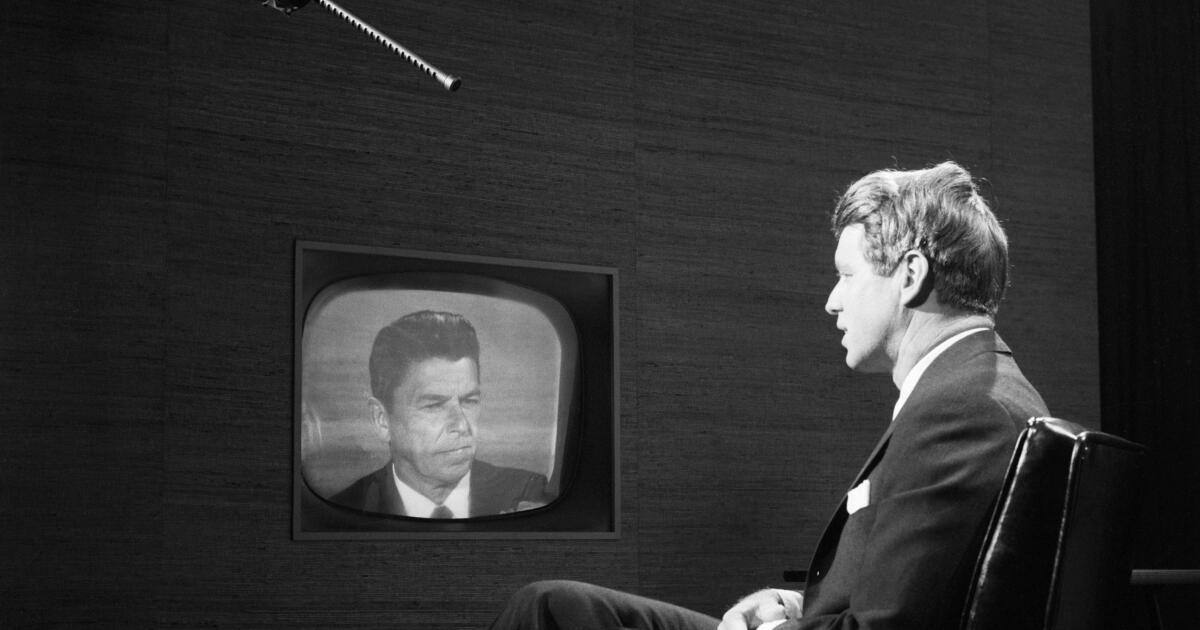They were two men seemingly destined for bigger, better things and, perhaps eventually, a head-to-head race for the White House.
One was California’s governor, who very much wanted to run for president.
The trouble was his party already had its leader — a political veteran who was the strong favorite to top the ticket.
The other was a big-state political celebrity whose path to the Oval Office also appeared blocked by his party’s well-established frontrunner.
And so, with evidently little to lose, Ronald Reagan and Robert F. Kennedy agreed to debate.
It was May 1967 and if the circumstances echo today’s prospective throwdown between Gavin Newsom and Ron DeSantis, it just goes to show there really is very little new beneath the sun.
Politically, anyway.
Among a certain set — those who follow campaigns the way others thrill to World Cup soccer — the notion of a face-to-face confrontation between Govs. Newsom of California and DeSantis of Florida is practically irresistible.
The two stand as totems of their respective parties. Newsom the slick embodiment of Left Coast liberalism, DeSantis the pugnacious personification of red-state conservatism.
They’ve repeatedly sparred long distance, hurling insults and tweaking each other with well-publicized stunts.
Newsom made a trolling campaign-style swing through Florida, stopping by a college campus DeSantis targeted in his “war on woke.”
DeSantis dumped a dozen Latin American asylum seekers on Sacramento and filmed a pop-up campaign spot in San Francisco — the city Newsom led as mayor — attacking “leftist policies” that have supposedly turned the city into an urban hellscape.
They’ve pawed and snorted over terms of a debate.
“Put up or shut up,” Newsom taunted via gubernatorial spokeman.
“Let’s get it done,” DeSantis trash-talked.
But for all the chesty swagger and back-and-forthing between principles, there is serious reason to question whether such a meeting will occur anytime soon, if ever.
For Newsom, there’s little incentive not to show. A debate would allow him to revel in the national attention he craves rather than, say, grapple with San Francisco’s fentanyl crisis or hassle with state lawmakers.
The calculation for DeSantis is different. As a declared presidential candidate, he has to weigh whether to share a stage and elevate someone whose White House designs are, for now, pure fantasy.
Most likely DeSantis’ decision will depend on how Florida’s flagging governor is situated after the first two debates with his Republican rivals.
The opening round is set for Wednesday night in Milwaukee. The second is scheduled for Sept. 27 at the Reagan Library in Simi Valley. The party’s petulant front-runner, Donald Trump, has said he will skip both dates.
When California’s Republican Gov. Reagan and New York’s Democratic Sen. Kennedy met, it wasn’t a debate in the way we’ve come to think.
(Even today’s presidential “debates” aren’t debates so much as forums where candidates stand alongside each other and answer questions, or duck them, while delivering prefabricated “zingers” aimed at producing a viral moment.)
Reagan and Kennedy appeared on a split screen, the governor from a studio in Sacramento and the senator in Washington, D.C. The subject was the Vietnam War or, more specifically, “The Image of America and Youth of the World.”
Under the format, the two politicians responded to questions from an international panel of college students gathered in London. (One of them, Princeton’s Bill Bradley, would go on to NBA stardom, a career in the U.S. Senate and an unsuccessful 2000 presidential bid.)
Reagan and Kennedy didn’t engage with one another so much as swat away barbs from their hostile inquisitors.
“I believe the war in Vietnam is illegal, immoral, politically unjustifiable and economically motivated. Could either of you agree with this?” one of their first questioners asked.
The candidates could not — or, rather, did not, agree with the premise — though Reagan, unsurprisingly, was the more hawkish of the two. (Not much later, Kennedy would be running for president as an anti-war candidate.)
Reagan’s performance drew wide notice.
Just a few months in office, the neophyte governor displayed a verbal dexterity and mastery of foreign policy that surprised many observers — not for the first or last time in his political career.
As Newsweek stated, “To those unfamiliar with Reagan’s big-league savvy, the ease with which he fielded questions about Vietnam may have come as a …revelation.”
Kennedy, for his part, meandered through much of the 50-minute exchange, appearing sullen and at times a bit bored. He was widely judged the loser.
Not that it mattered all that much.
Kennedy would go on to strongly vie for the Democratic nomination after President Johnson’s stunning decision to stand aside and not seek reelection. His candidacy was, of course, was cut short by an assassin’s bullets.
Reagan would fail miserably in his 1968 bid to snatch the GOP nomination from Richard Nixon. He lost the Republican nominating fight again in 1976 before finally claiming the presidency in 1980.
A Newsom-DeSantis debate would surely have its interesting and entertaining moments, the way any clash of antagonists strikes sparks.
But it’s not likely to change the course of the 2024 campaign, much less any contest in 2028 or beyond, nor would it usher either Newsom or DeSantis into the White House.
Political theater can be entertaining. But even Reagan needed more than a boffo one-night performance to become president.
This story originally appeared on LA Times

